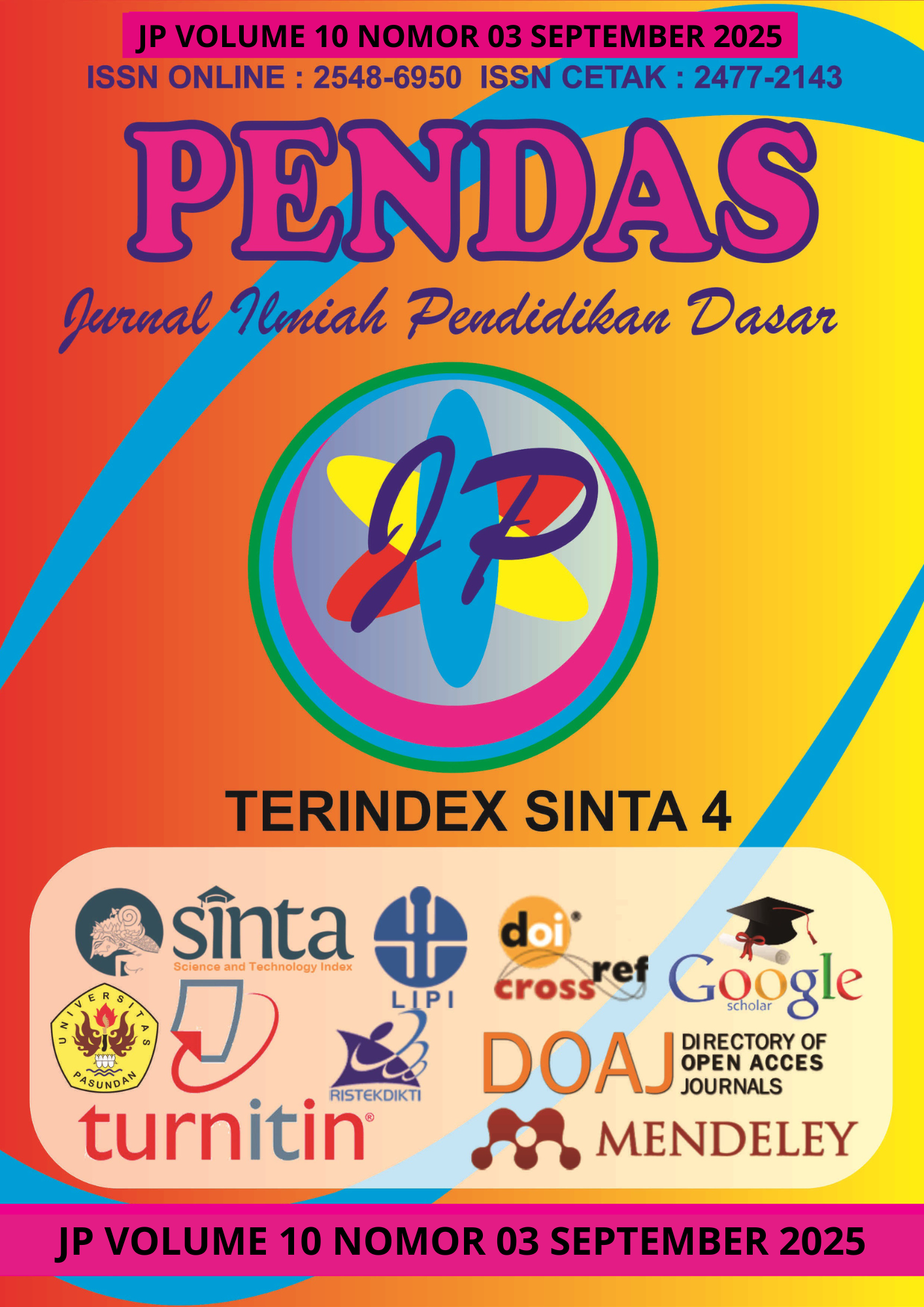ANALISIS KEBUTUHAN MEDIA PEMBELAJARAN INTERAKTIF UNTUK MENGHAFALKAN PERKALIAN PADA SISWA KELAS IV SEKOLAH DASAR
DOI:
https://doi.org/10.23969/jp.v10i3.28323Keywords:
learning needs, interactive media, fun learning, elementary school studentsAbstract
This study aims to analyze the need for developing interactive learning media to improve multiplication memorization skills among fourth-grade elementary students. The issue addressed is the students’ low mastery of multiplication, particularly with higher numbers, and the lack of effectiveness in conventional teaching methods. The research employed a descriptive quantitative approach with data collection techniques including closed questionnaires for 17 students of Class IV-C and open interviews with the homeroom teacher. The findings indicate that most students experience progressive difficulty in memorizing multiplication and express a strong preference for fun and interactive learning. Meanwhile, the teacher acknowledged the limitations of current methods and highlighted the need for innovative media tailored to students' learning styles. These results underscore the urgent need to develop interactive learning tools that enhance student engagement, simplify abstract concepts, and support gradual and sustained multiplication memorization.
Downloads
References
NCTM. (2020). Standards for Mathematics Teacher Preparation. National Council of Teachers of Mathematics.
Djamarah, Syaiful Bahri dan Aswan Zain. (1996). Strategi Belajar Mengajar. Jakarta: Rineka Cipta.
Nurmalia, L., et al. (2022). Pengembangan bahan ajar berbasis buku pada topik wujud benda dalam tema 3 (Benda di sekitarku) kelas III SDN Margahayu VI dengan pendekatan kontekstual. Jurnal Pendidikan Dasar Nusantara, 3(3).
Herni, H., Waspodo, M., & Wibowo, S. (2023). Pengembangan media interaktif berbasis Android pada materi operasi hitung perkalian dan pembagian pecahan kelas V SDN Babakan 02 Kecamatan Ciseeng Kabupaten Bogor. Educate: Jurnal Teknologi Pendidikan, 8(1), 75–85.
Nurmalia, L., Iswan, I., Prasanti, A., Syahidah, H., & Azizah, M. (2022, Oktober 26). Pengembangan media pembelajaran pocket book Matematika SD materi perkalian, pembagian, dan mata uang kelas II. Dalam Seminar Nasional Penelitian LPPM UMJ 2022 (hlm. 0132–UMJ–PA). Universitas Muhammadiyah Jakarta.
Nugraha, C. (2024). Pengembangan Media Pembelajaran Interaktif untuk Meningkatkan Kemampuan Pemecahan Masalah Matematika. Jurnal Dunia Ilmu, Vol 4 No. 1.
Rahayu, I. R., & Rukmana, D. (2022). The effect of game-based learning model assisted by Baamboozle on the multiplication skills of elementary school students. PRIMARY: Jurnal Pendidikan Guru Sekolah Dasar, 11(3), 806–814.
Beti Istanti Suwandayani, Cholis Sa’dijah, Punaji Setyosari, Suyono, Siti Salina Mustakim. (2023). Learning Mathematics Using Augmented Reality for Elementary School Students. Journal for ReAttach Therapy and Developmental Diversities, 6(1), 450–467.
Zainuddin, Z., Chu, S. K. W., Shujahat, M., & Perera, C. J. (2020). The impact of gamification on learning and instruction: A systematic review of empirical evidence. Educational Research Review, 30, 100326.
Piaget, J. and Inhelder, B. (1969). The Psychology of the Child. Basic Books, New York.
Merriam, S. B. (2009). Qualitative research: A guide to design and implementation. San Francisco, CA: Jossey-Bass.
Creswell, J. W., & Creswell, J. D. (2018). Research Design: Qualitative, Quantitative, and Mixed Methods Approaches. United Kingdom: Sage.
Nalusay, C., Demoral, D., & Suguis, J. (2024). Enhancing grade 6 students’ multiplication automaticity through interactive taped problems. International Journal of Research and Innovation in Social Science, 8(3), 4886–4895.
Suratmi, S. (2021). Peningkatan hasil belajar materi perkalian bilangan cacah melalui metode permainan dan media kartu bilangan pada siswa kelas II SDN Sendangmulyo. Jurnal Pendidikan, 30(1), 95–104.
Al‑Barakat, A. A., AlAli, R. M., Al‑Hassan, O. M., & Aboud, Y. Z. (2025). Evaluating the Effectiveness of Electronic Games‑Based Learning in Enhancing Children’s Multiplication Skills and Cognitive Achievement. International Journal of Information and Education Technology, 15(5), 947–954.
Dotan, D., & Zviran-Ginat, S. (2022). Elementary math in elementary school: The effect of interference on learning the multiplication table. Cognitive Research: Principles and Implications, 7, Article 101.
Hui, H. B., & Mahmud, M. S. (2023). Influence of game-based learning in mathematics education on the students’ cognitive and affective domain: A systematic review. Frontiers in Psychology, 14.
Nguyen, N. D., Trung, L. T. B. T., Nga, N. T., & Dung, T. M. (2024). Digital game-based learning in mathematics education at primary school level: A systematic literature review. EURASIA Journal of Mathematics, Science and Technology Education, 20(4).
Khoirunisa, I., Purwoko, R. Y., & Anjarini, T. (2023). Multimedia interaktif berbasis Contekstual Teaching Learning pada materi pecahan sederhana di sekolah dasar. Edukasiana: Jurnal Inovasi Pendidikan, 2(3), 186–196.
Hidayat, R., Qi, T. Y., Ariffin, P. N. B. T., Hadzri, M. H. B. M., Chin, L. M., Ning, J. L. X., & Nasir, N. (2024). Online game-based learning in mathematics education among Generation Z: A systematic review. International Electronic Journal of Mathematics Education, 19(1)
Downloads
Published
Issue
Section
License
Copyright (c) 2025 Pendas : Jurnal Ilmiah Pendidikan Dasar

This work is licensed under a Creative Commons Attribution 4.0 International License.



















